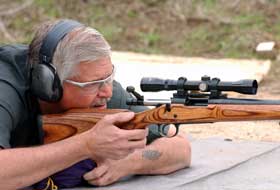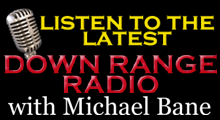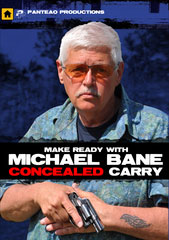On a
previous post of mine, a commenter asked:
"...what percentage of time during the day should a regular walking around middle class person think about shooting people, dogs and things?"
You know, given what we do, I think that's a fair question. At least in my case, the answer is, "Never." That's because I carry a gun day in and day out and have done so for decades, which means I've already answered that question. Read
TRAIL SAFE, or at least read the new version when I finally finish it...even I wouldn't pay the current scalpers' prices for the book! Since you can't buy it, here's a quick excerpt:
A gun isn’t a magic wand that repels bad guys. Think of it, instead, as a fire extinguisher. If you’re looking to prevent fires in your home, a fire extinguisher isn’t your first purchase. Instead, you analyze your home with an eye toward minimizing fire risks. Is the wiring old and sparking every time you turn on a switch? The solution is new wiring; the fire extinguisher is strictly for secondary protection. BEFORE you make the decision to purchase a gun, you need to study your lifestyle, your home, your family, with an eye on minimizing risks.
It’s worth noting that those of us have owned and used guns for years have quite literally changed our lifestyles to accommodate that decision. My house is secure. My locks are good. I live in a safe neighborhood in a safe small city. I own an excellent gunsafe. I don't broadcast the fact that I own and carry guns.
A gun is part of a self-defense system that includes the gun, it’s ammunition, a way to reload the gun, a way to carry the gun, a place to store the gun and, most important of all, TRAINING on how to use the gun and an understanding of your LEGAL obligations.
[...]
We're now down to the hard part. A few chapters back, we talked about The Question—how far are you willing to go to protect your own life, or the lives of others in your care?
If you choose to carry a gun for self defense, you must be absolutely sure of your answer to the question.
Absolutely.
Why? Because if you're bluffing, if you haven't truly answered The Question, in a real situation your assailant will take the gun away from you and kill you with it. It is that simple. I once counseled a woman who had been mugged and wanted to buy a gun to protect herself. I taught her to shoot with my own guns, but the wore we talked, the more I realized that she hadn't thought the whole thing through. Why not, she kept asking, can't I bluff or "only shoot them in the leg?"
The answer to the first part is what I stated (flatly) above—predators always recognize prey. Violent criminals are no strangers to violence (another "duh!"), and they've usually seen a gun pointed at them before. Violent crimes does indeed remind me a lot of interviewing (which says a lot about journalists), at least at the beginning.
Everything I've tried to get across in this book is also taking place in your assailant's head. He or she is trying to read you, to get a sense of what's going on in your head. If you are holding a gun, and your assailant senses that you are not serious about using it, you are going to lose that gun, and in all likelihood, it's going to be turned against you. This is sort of the ultimate escalation—you lose your weapon and you arm your enemy.
Remember we said earlier that a gun was like a fire extinguisher? Let's continue on with that analogy. When there is a small fire in your kitchen and you grab your fire extinguisher, what do you hope to accomplish?
To put the fire out, right?
And you have a limited resource to accomplish this; fire extinguishers won't keep spraying forever. So to maximize the chances that you're going to be able to extinguish the fire, you direct your limited firefighting resources directly at the center of the fire. You don't spray around the outside edges of the fire to keep it from spreading—it's burning a hole through your kitchen floor, after all. You don't give the right side of the fire a squirt in the hopes that it will quit on its own. You don't mess around with even a small fire because you understand completely that, unless you act decisively, the fire will destroy your house and maybe even kill you.
This is the mindset we must have when we are in fear for our lives and must act!
When we pick up our fire extinguisher, it must be with the intent of stopping the fire. If I am forced to go to my weapon, it is with the intent of stopping a lethal threat against me or someone under my responsibility.
I will never "shoot to kill;" nor will I ever "shoot to wound." I will ONLY "shoot to stop."
A few chapters back, when we first talked about The Question, it was with the idea of discovering how far each of us is willing to go to protect ourselves. This is where the rubber meets the road. If I am in fear of my life, or (to use the general legal description of when I am legally able to respond with deadly force) if I as a reasonable person believe that I am in imminent danger of death or serious bodily harm that can only be averted by the use of deadly force against the assailant, my sole, singular and only goal is the MAKE THE ASSAILANT STOP IMMEDIATELY!
I am at this horrific point not concerned with the welfare of the assailant; what the motives are behind the attack; the race, creed, sex or sexual orientation of my attacker; whether my attacker is mentally unstable or mentally ill; what has driven my attacker to do these deeds. I am not concerned in the slightest whether my attacker survives this encounter.
My only concern is ENDING THE LETHAL THREAT AGAINST ME IMMEDIATELY.
Period.
And think about it—isn't that what we've been talking about on every single page of this book? Every point in our strategic tree has been aimed at ending the threat against us immediately. We plan; we avoid; we retreat; we placate; we talk; we try non-lethal means...we do everything we can to end the threat against us immediately.
Col. Jeff Cooper actually answered the commenter's question much more succinctly years and years ago:
"Individually, we do not bear arms because we are afraid. We bear arms as a declaration of capacity. An armed man can cope. either in the city or in the wilderness, and because he is armed he is not afraid.
This is the root of hoplophobia [the pathelogical fear of firearms]. The hoplophobe fears and, yes, hates us because we are not afraid. We are overwhelmingly 'other' than he, and in a way that emphasizes his affliction. There is not much room for compromise here..."






11 comments:
Excellent post Michael.
I especially like the fire extinguisher analogy.
Being a fire guy for 30 yrs, I have a special place in my heart for kicking a fires ass with no quarter asked for, or given.
When I pull my hose out, I ain't bluffing! :)
Your fire extinguisher analogy is even more apt than you realize:
http://www.metro.co.uk/news/article.html?in_article_id=115014&in_page_id=34
Yes indeed. In the UK fire extinguishers are now being relegated to "the only ones".
Joe
"I don't broadcast the fact that I own and carry guns."
Uh, Michael... It's called Shooting Gallery, Cowboys, The Best Defense and Down Range TV.
(Kidding. I kid because I care. Seriously).
Good piece.
Excellent! Great!
As a police officer, I hear all to often the "why did they have to kill him?","they are trained to shoot, why didn't they just shoot him in the leg?"
Yeesh! Now I have a great analogy to throw out to the bleeding hearts who question a law officers every move!
I hope that this post is linked to and spread far and wide. One of the best analogies I've heard or read and an excellent response to the central question.
Well done, Michael.
...And joemerchant24, I had *exactly* the same thought. ;)
The Colonel had the perfect Sound Bite:
"Don't get scared; get mad!"
When you are forced to defend yourself, it serves no useful purpose to regret finding yourself in that position. Better to be outraged that the aggressor has forced you into that position.
Let him regret the grevious wounds he suffers, rather than to ruin your life by regretting that you were forced to inflict them. If he lives to regret it, you need more range time.
When you absolutely have to shoot, you will know it. It's not your fault.
Finish the book rewrite, Michael. I want to buy it.
Excellent...gotta buy the book. I only shoot to stop...a true statement. I don't try to wound, hurt or kill someone; I only shoot to stop them from killing me or my family.
I can''t wait till the new version comes out. I like the Fire Extinguisher comparison.
$57 - 117 is the range of prices I've found for your paperback that ran about $15 in 2000. Sounds as if it would have been one heck of an investment! Please, please finish the re-write! OldeForce
love this post. My friend ptgustan linked over to it from bastionofreason.com.
Massad Ayoob also uses the fire extinguisher analogy ... his police department budget does not have a line item for "firearms", but rather for "rescue safety equipment".
The purpose of the gun for the armed citizen is to knock down the threat enough to clear a safe path of escape until the professionals arrive on the scene. It works for me. Great article....
Post a Comment